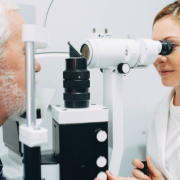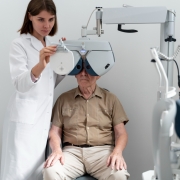What’s Causing These Sparkles in My Vision?
Have you or a loved one ever noticed seeing sparkles in your vision? This “phenomenon” isn’t evidence of another world or a sign of anything except that you might need to see youroptometrist in Falls Church, VA. We get it, though. Seeing sparkles, flashes or shimmering lights in your vision can be both puzzling and concerning. While these visual disturbances may seem interesting, they can indicate various underlying issues that should be addressed. Here’s what you need to know.
Ocular Migraines
Did you know you can have a headache without pain? One common cause of sparkles in your vision is ocular migraines, also known as visual migraines. These occur when blood flow to your visual cortex is temporarily disrupted, leading to visual symptoms such as flashing lights, zigzag patterns, or shimmering areas. Unlike traditional migraines, ocular migraines don’t always cause a headache, and those shiny sparkles in your vision might be an important clue that this is what’s actually happening..
Posterior Vitreous Detachment
As we age, the gel-like substance in our eyes called the vitreous can begin to shrink and pull away from the retina. This process, known as posterior vitreous detachment (PVD), can create the sensation of sparkles or flashes of light. While PVD is often harmless, it’s important to monitor for other symptoms like a sudden increase in floaters or dark spots, which could indicate a retinal tear. This is nothing to mess with, as it can lead to vision loss or blindness if left untreated.










